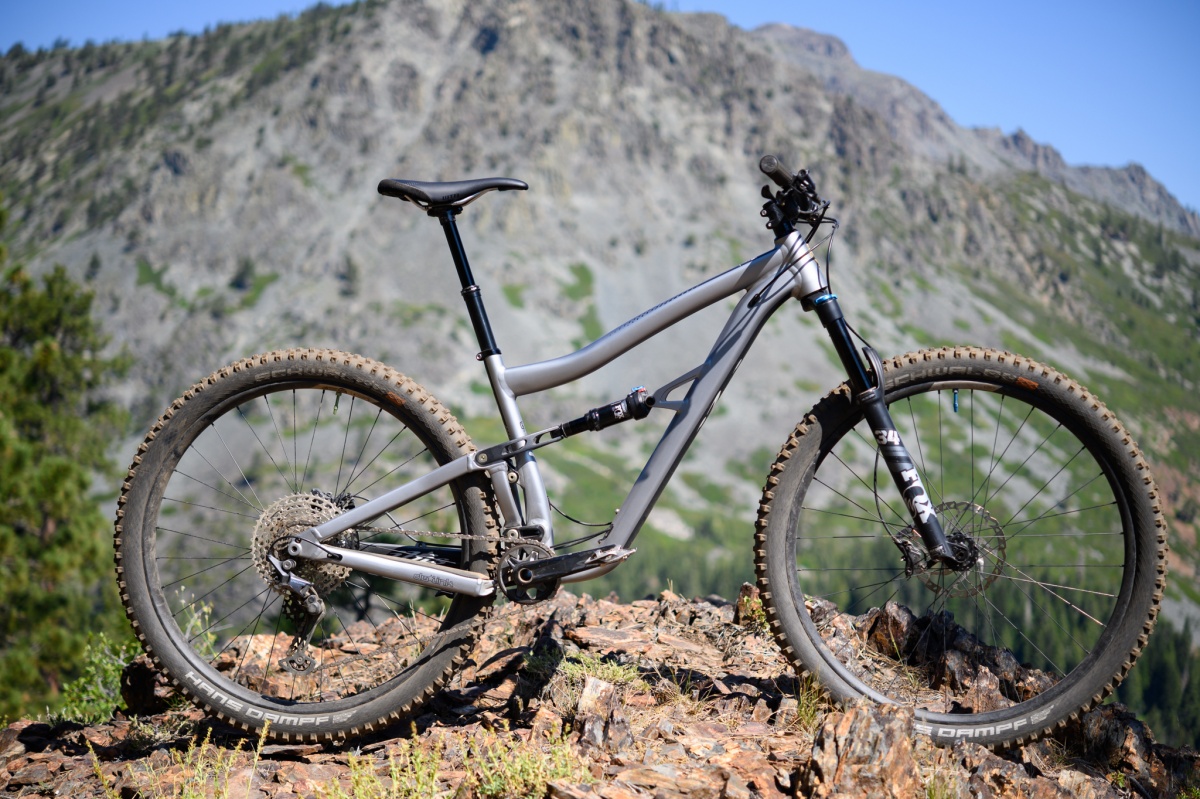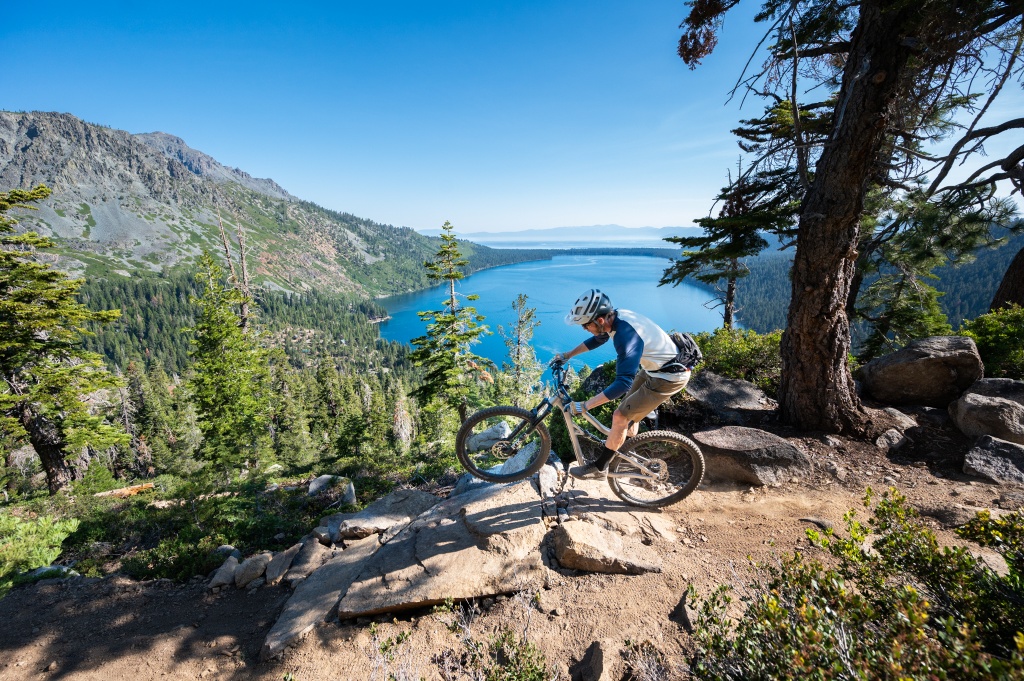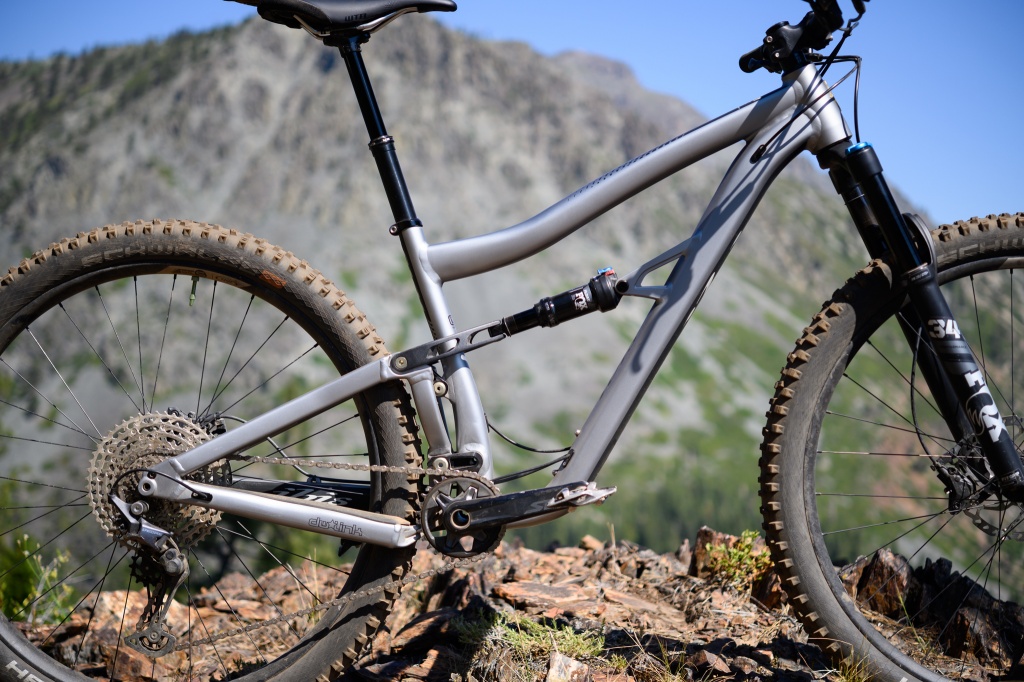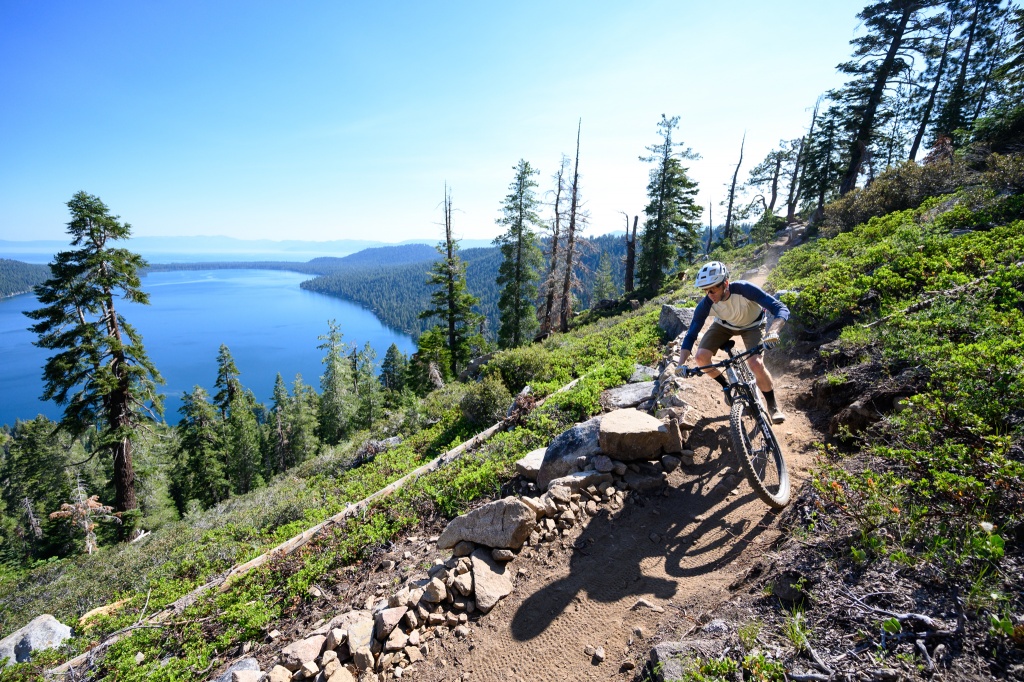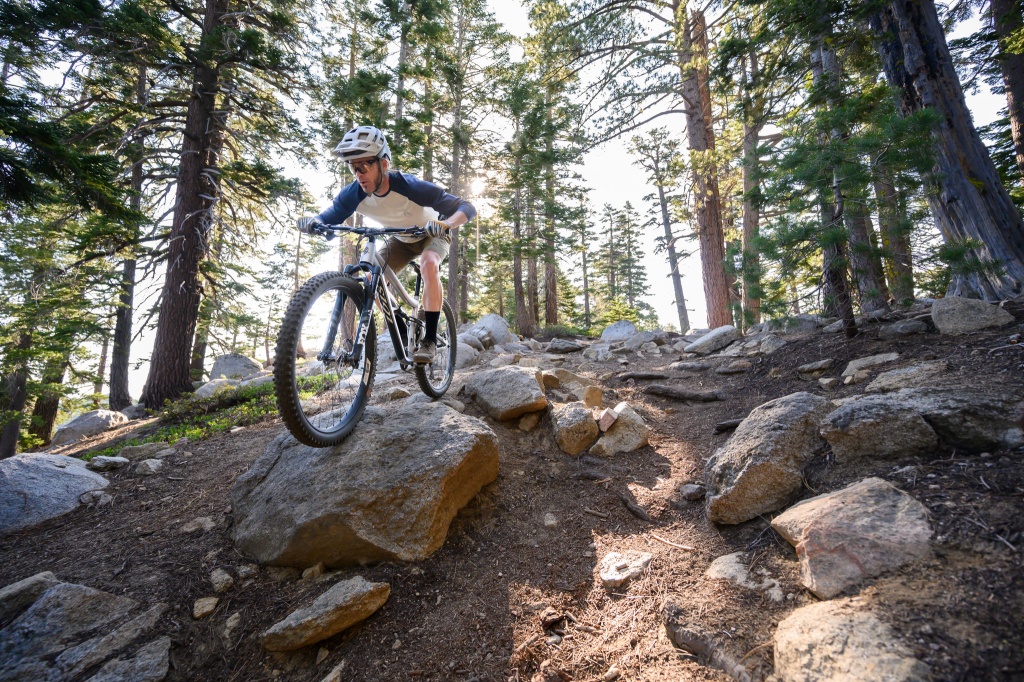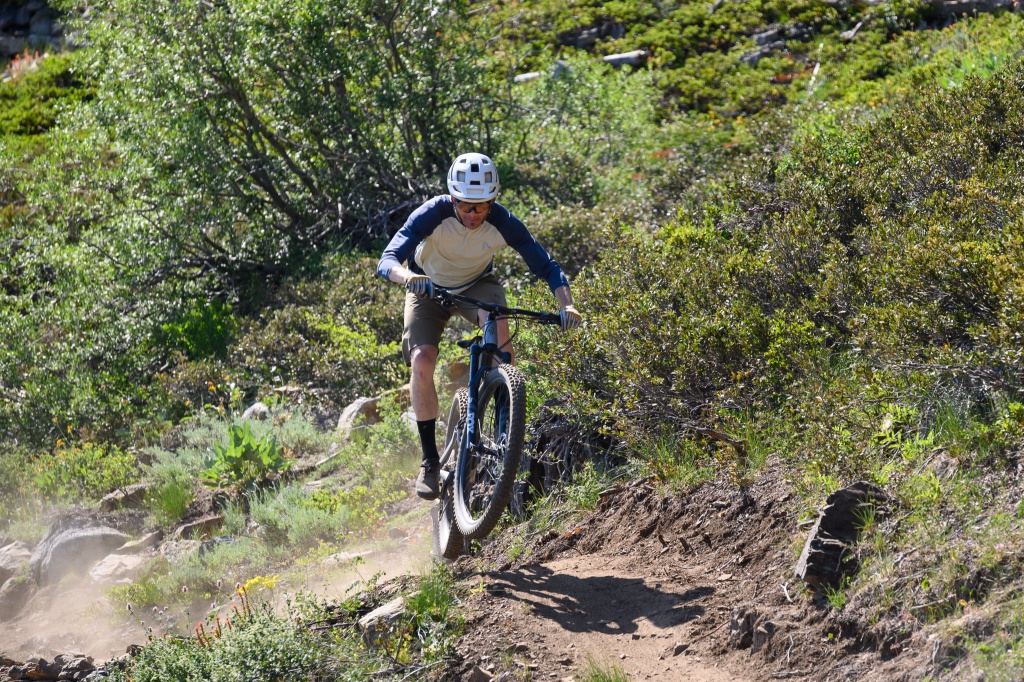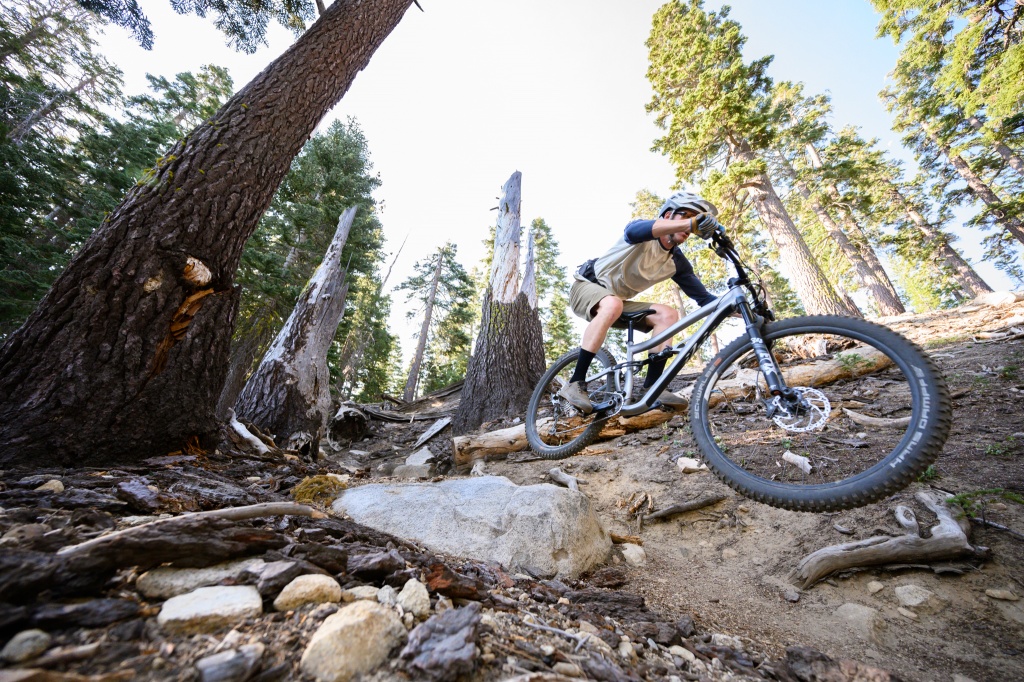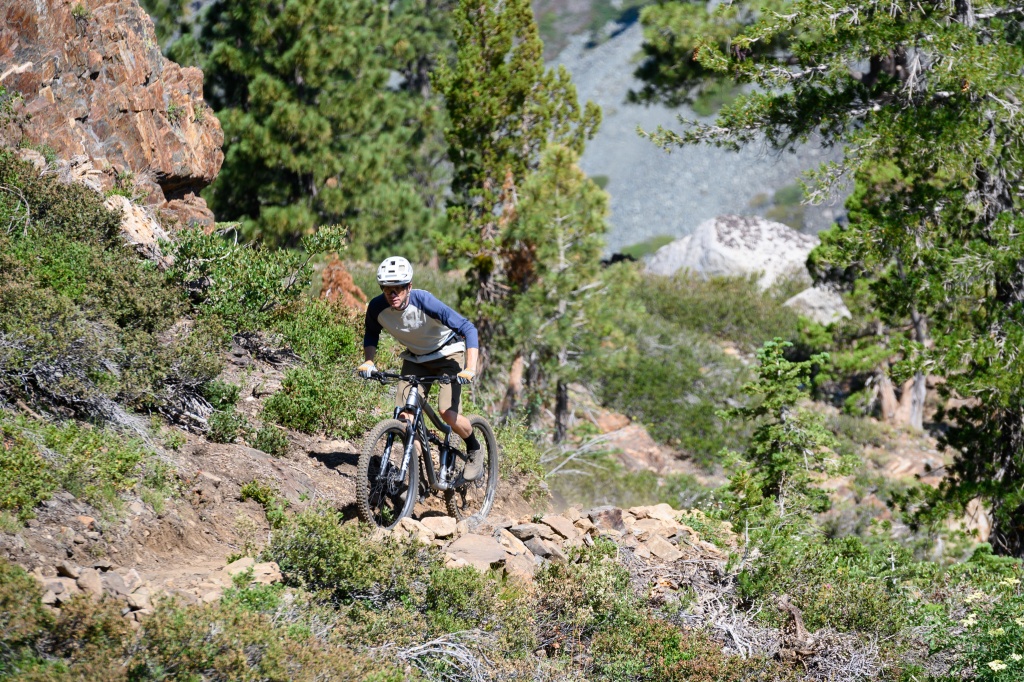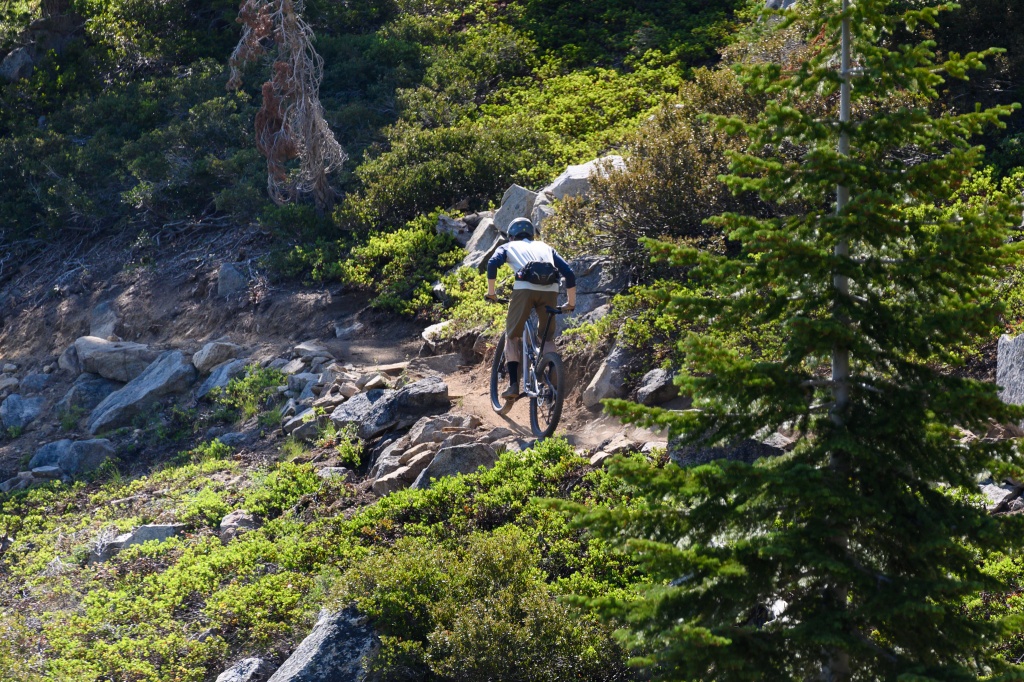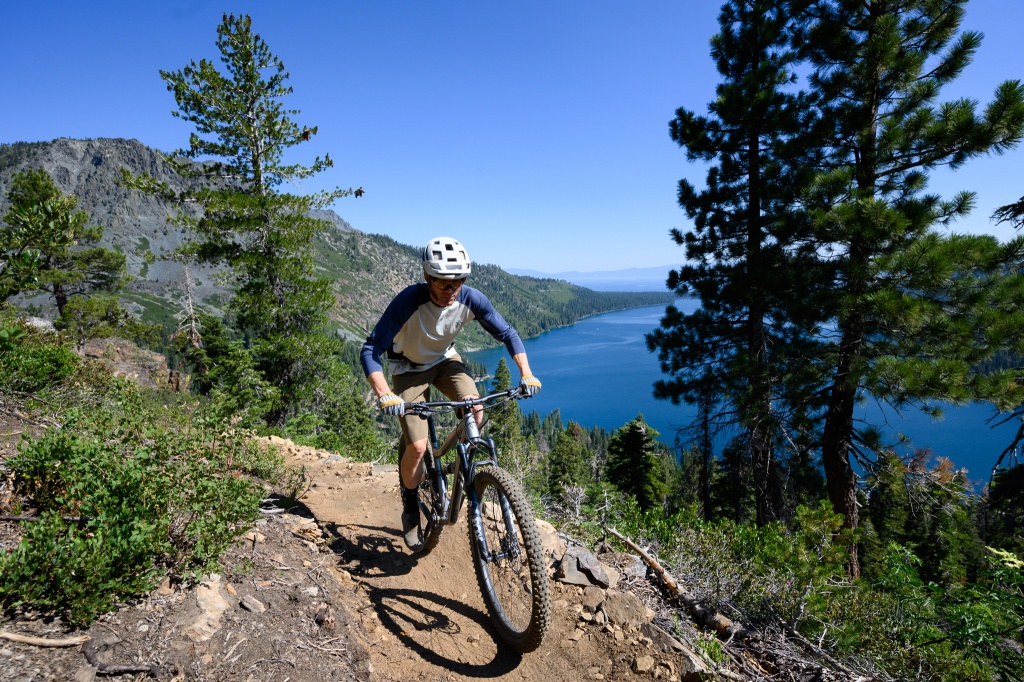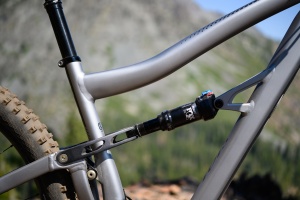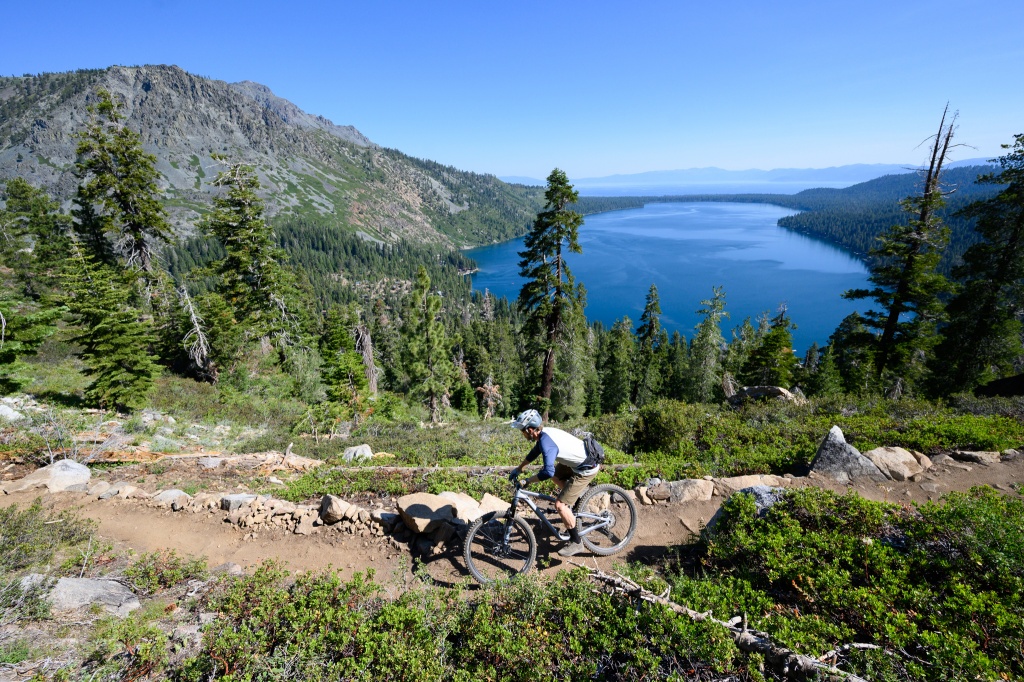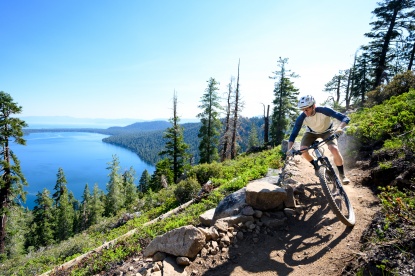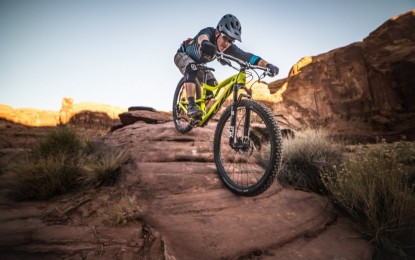The Ripley AF gets an update for 2024 with a Universal Derailleur Hanger, new colors, and some new build kits. Pricing of this model goes up to $3299 with a less expensive SRAM GX build.
Ibis Ripley AF Deore Review
Our Verdict
The Ripley AF gets an update for 2024 with a Universal Derailleur Hanger, new colors, and some new build kits. Pricing of this model goes up to $3299 with a less expensive SRAM GX build.
Compare to Similar Products
 This Product
Ibis Ripley AF Deore | |||||
|---|---|---|---|---|---|
| Awards | Best Aggressive Trail Bike | ||||
| Price | $3,199 List | $4,300 List $2,800 at Evo | $2,999 List | $4,400 List | $3,499 List |
Overall Score  |
|||||
| Star Rating | |||||
| Bottom Line | Ibis' versatile and fun-loving short travel trail bike in a more affordable but slightly heavier aluminum-framed package | An innovative, highly adjustable longer travel trail bike that can span disciplines from everyday trail riding to bike park laps | The aluminum framed Ibis Ripmo AF is the best aggressive trail bike you'll find at this price | The new Rift Zone Carbon 2 joins the growing aggressive short travel trail bike market | The lightweight and lively Canyon Neuron CF 8.0 is a sporty mid-travel trail bike with more of an XC feel |
| Rating Categories | Ibis Ripley AF Deore | Specialized Stumpju... | Ibis Ripmo AF NX Eagle | Marin Rift Zone Car... | Canyon Neuron CF 8.0 |
| Fun Factor (25%) | |||||
| Downhill Performance (35%) | |||||
| Climbing Performance (35%) | |||||
| Ease of Maintenance (5%) | |||||
| Specs | Ibis Ripley AF Deore | Specialized Stumpju... | Ibis Ripmo AF NX Eagle | Marin Rift Zone Car... | Canyon Neuron CF 8.0 |
| Wheel size | 29" | 29" | 29" | 29" | 29" |
| Suspension & Travel | DW-Link - 120mm | FSR - 150mm | DW-Link - 147mm | MultiTrac Suspension - 125mm | Triple Phase Suspension - 130mm |
| Measured Weight (w/o pedals) | 33 lbs 3 oz (Large) | 31 lbs 14 oz (Large) | 34 lbs (Large) | 31 lbs 9 oz (Large) | 28 lbs 10 oz (Large) |
| Fork | Fox 34 Performance - 130mm | Fox 36 Rhythm - 160mm | DVO Diamond D1 160mm | Fox Float 34 Performance 130mm 34mm stanchions | Fox 34 Rhythm 130mm 34mm stanchions |
| Shock | Fox Float DPS Performane EVOL | Fox Float DPX2 Performance | DVO Topaz T3 Air | Fox Float DPX2 Performance EVOL | Fox Float DPS Performance |
| Frame Material | Aluminum | FACT 11m Carbon Fiber | Aluminum | Carbon Fiber | Carbon Fiber |
| Frame Size | Large | S4 (Large equivalent) | Large | Large | Large |
| Frame Settings | N/A | Flip Chip and Headtube angle | N/A | N/A | N/A |
| Available Sizes | S-XL | S1-S6 | S-XL | S-XL | XS-XL |
| Wheelset | Ibis S35 Aluminum rims with Ibis hubs, 35mm ID | Roval 29 alloy rims with Shimano Centerlock hubs, 30mm ID | Ibis S35 Aluminum rims with Ibis hubs, 35mm ID | Marin Aluminum Double Wall rims 29mm ID with Shimano hubs | DT Swiss M 1900, 30mm ID front and 25mm ID rear |
| Front Tire | Schwalbe Hans Dampf 2.6" | Specialized Butcher GRID TRAIL T9, 2.6" | Maxxis Assegai EXO+ 2.5" | Maxxis Minion DHF EXO+ 2.5" WT | Maxxis Forekaster 2.35" EXO 3C Triple |
| Rear Tire | Schwalbe Hans Dampf 2.6" | Specialized Eliminator GRID TRAIL T7, 2.3" | Maxxis Assegai EXO+ 2.5" | Maxxis Minion DHR II EXO+ 2.4" WT | Maxxis Forekaster 2.35" EXO 3C Maxx Speed |
| Shifters | Shimano Deore 12-speed | Shimano SLX 12-speed | SRAM NX Eagle | Shimano SLX 12-speed | SRAM GX Eagle |
| Rear Derailleur | Shimano Deore 12-speed | Shimano SLX 12-speed | SRAM NX Eagle | Shimano XT 12-speed | SRAM GX Eagle |
| Crankset | Shimano Deore M6100 30T | SRAM Descendant 7K 32T | SRAM NX Eagle DUB 32T | FSA Gradient 32T | Truvativ Stylo 6K DUB 30T |
| Saddle | WTB Silverado 142mm | Specialized Bridge Comp | WTB Silverado Pro | Marin Trail Speed Concept Pro | Iridium Trail |
| Seatpost | KS Rage-i 150mm(Large) | X-Fusion Manic 170mm (S4/S5), 34.9 diameter | KS Rage-i 150mm(Large) | X-Fusion Manic 150mm w/ PNW Loam lever | Iridium Dropper |
| Handlebar | Ibis 780mm Alloy | Specialized 6061 alloy, 30mm rise, 800mm width | Ibis 780mm Alloy | Deity Skyline 787mm 25mm rise | Iridium Flatbar |
| Stem | Ibis 31.8mm 50mm | Specialized Alloy Trail stem, 35mm bore | Ibis 31.8 50mm | Marin 3D forged alloy | Iridium |
| Brakes | Shimano Deore M6120 4-piston | Shimano SLX 4-piston | SRAM Guide T 4 piston | Shimano SLX | SRAM Guide T |
| Measured Effective Top Tube (mm) | 630 | 625 | 631 | 630 | 620 |
| Measured Reach (mm) | 475 | 475 | 473 | 480 | 453 |
| Measured Head Tube Angle | 65.5-degrees | 63-65.5 (adjustable) | 64.9-degrees | 65.5-degrees | 67.1-degrees |
| Measured Seat Tube Angle | 76-degrees | 76.9-degrees | 76-degrees | 76-degrees | 75.0-degrees |
| Measured Bottom Bracket Height (mm) | 335 | 340 H/333 L | 340 | 338 | 335 |
| Measured Wheelbase (mm) | 1217 | 1247 | 1239 | 1212 | 1196 |
| Measured Chain Stay Length (mm) | 432 | 438 (S1-S4) | 435 | 425 | 442 |
| Warranty | Seven Years | Lifetime | Seven Years | Five Years | Six years |
Our Analysis and Test Results
Should I Buy This Bike?
The Ibis Ripley AF Deore is an affordable short travel trail bike that makes sense for a lot of riders. This versatile ride builds on the nimble and playful legacy of the carbon Ripley in a more budget-conscious aluminum-framed (AF) package. Ibis kept the AF true to its roots, with 120mm of rear travel paired with a 130mm fork and just-right modern geometry. It maintains the liveliness that has been a hallmark of the Ripley with a degree slacker head tube angle and a slightly longer wheelbase to help enhance its stability at speed and composure in steeper, rougher terrain. The DW-Link suspension provides great small-bump compliance, mid-stroke support, and enough progression to give it a more-travel-than-it-actually-has feel. On the climbs, the suspension platform is very calm and the Ripley AF climbs more efficiently than you'd expect for a 33 lb bike. The steep seat tube and roomy cockpit combine for a comfortable seated position and well above average technical climbing abilities. Make no mistake, the added weight is somewhat noticeable, and this bike doesn't climb quite as swiftly as the lighter carbon version, but our testers didn't really seem to mind. On the descents, that weight also manifests itself in a slightly damper and more relaxed feel, which isn't necessarily a bad thing either. The Deore build we tested is the least expensive offered, but Ibis nailed most of the important components like the wheels/tires, suspension, and drivetrain while managing to keep the price out of the stratosphere.
How does the Ripley AF compare to the carbon Ripley? Well, the first and most glaring difference is the weight. The carbon frame weighs 2.45 lbs less than the aluminum frame. That is quite significant and surely contributes to the carbon Ripley's razor-sharp handling, precision, and all-around quickness. The carbon model also has a 66.5-degree head tube angle, a full degree steeper, which helps to keep the steering super responsive, but makes it ever so slightly more nervous feeling in steeper, rougher terrain. Of course, there's also the price, and the carbon model will set you back an additional $1,900 for the complete Deore build. That said, it comes with upgraded Fox Factory suspension and 4-piston brakes. Carbon Ripley builds range in price from $5,099 to $11,499.
The Santa Cruz Tallboy is another interesting comparison. The Tallboy also rolls on 29-inch wheels and has 120mm of rear suspension and a 130mm fork. Both bikes share very similar geometry measurements and intended uses. Comparing the two is kinda like splitting hairs, but the biggest difference is in the performance of the suspension. Santa Cruz's VPP suspension design is quite supportive and handles big hits very well. Ibis' DW-Link offers better small bump compliance and a generally more refined feel overall. The Tallboy also comes in more frame sizes, six total from XS-XXL. Santa Cruz makes the Tallboy in both carbon and aluminum frames ranging in price from $3,099 up to $11,549. The base model Tallboy Aluminum D goes for $3,099 but comes with downgraded wheels, drivetrain, and suspension components compared to the Ripley AF Deore.
Frame Design
Ibis gave the aluminum-framed Ripley AF similar lines and looks to the carbon model, as well as the same DW-Link suspension design. DW-Link is a dual-link system with two links attaching the rear triangle to the seat tube, one about mid-way up and the other just above the bottom bracket. Both links move in the same direction as the bike cycles through its travel, with a clevis driving the rear shock which is attached about 2/3 of the way up the downtube. The DW-Link design provides a stable pedaling platform, excellent small bump compliance, a supportive mid-stroke, and ample progression at the end of the travel. The frame also features internal cable routing, room within the front triangle for a full-size water bottle, and molded chainstay protection. The Ripley AF comes in four frame sizes, Small-XL.
Like they did when they came out with the Ripmo AF, Ibis made some minor changes to the geometry of the Ripley AF compared to the carbon version. The main difference is the 65.5-degree head tube angle, which is a full degree slacker than the carbon model. The slacker head tube angle also adds 10mm to the wheelbase length across all sizes, and our size Large measured 1,217mm. The rest of the measurements remain the same, with a 630mm effective top tube length, 475mm reach, 432mm chainstays, and a 76-degree effective seat tube angle. Our large test bike tipped the scales at 33 lbs and 3 oz set up tubeless without pedals.
Design Highlights
- Aluminum frame (AF)
- 29-inch wheels only
- 120mm of DW-Link rear suspension
- Designed around a 130mm reduced offset fork
- Internal cable routing
- Threaded bottom bracket
- Room in the front triangle for a full-size water bottle
- Sold as frame and shock only for $1,899
- Complete builds ranging from $3,199 to $4,099
Downhill Performance
For a short travel bike, the Ripley AF is a versatile downhill shredder that feels both nimble and planted at the same time. It slices and dices, yet provides the confidence to cash a few checks beyond its short travel pay grade. The geometry is up to date and the DW-Link suspension design is dialed in and works well in all situations. Ibis finished it off with a quality component specification, for the price, that doesn't leave you wanting on the descents.
Like most modern trail bikes, the Ripley's geometry has grown a little longer and slacker every time a new version is released. With the AF, Ibis kept almost everything the same as the carbon version except for the head tube angle which was slackened by a full degree to 65.5. This change also led to a corresponding increase in wheelbase length of 10mm across all frame sizes. Chainstay, effective top tube, and reach measurements all remain the same, and we think that's a good thing. Travel numbers are also the same, with a modest 120mm in the rear paired with a 130mm fork. The result is as you might expect. The Ripley AF has the signature personality that has permeated through every iteration of this bike. It's lively, playful, and responsive as we've come to expect, yet it feels surprisingly stable and composed when you want it to. The slacker head tube and slightly longer wheelbase provide a bit more confidence at speed or when rolling into a steep section of trail without detracting noticeably from the bike's handling or performance on mellower trails. It is still a short travel trail bike, of course, so it rewards good technique and line choice when things get super rough. That said, the geometry and balanced suspension allow it to handle terrain typical reserved for bikes with more travel. Due to the additional weight, the AF does feel a touch more muted and can't match the razor-sharp precision of the carbon version, but that's hardly a complaint.
The DW-Link suspension design feels like it has been dialed in to perfection. Small bump compliance is excellent, and the Ripley AF soaks up vibrations and trail chatter better than most. The mid-stroke has a supportive feel, and it performs well over high-frequency chop and mid-sized chunk. It also helps to give the Ripley a spunky, poppy demeanor when pumping or playing your way down the trail and responds well when you hammer on the pedals out of a corner. Despite having only 120mm of travel to work with, the progression at the end of the stroke helps to give the Ripley a relatively bottomless feel, within reason, of course. Yes, you can find the limits of this bike's travel, but you've got to go out of your way to do it. Again, the Ripley AF gives the impression that has a little more travel than it does, and skilled riders who can pick smooth lines should be able to tackle just about anything on it.
For the price, Ibis did a great job choosing components for the Deore build that generally help to enhance its downhill performance. The Performance level Fox Float 34 fork and Fox Float DPS shock both work well and are nicer than you'll find on most other bikes at this price point. The stock Ibis S35 wheels have a trail dampening feel with a 35mm inner rim width that plays very well with today's modern tire widths. The stock Maxxis tire combo (our test bike had Schwalbe Hans Dampfs) of a Minion DHR II and a Dissector should also be sure to please most the majority of trail riders and not require an immediate upgrade. We found the Ibis handlebar and stem combo to provide a forgiving yet responsive front end, and the 170mm KS Rage-i dropper (drop length varies by frame size) ensures you can get your saddle low and out of the way on descents. The Shimano Deore 2-piston brakes get the job done and have a great lever feel, although we think some slightly more powerful brakes would be a welcome addition.
Climbing Performance
One of the hallmarks of all Ripley models has been their climbing prowess, and the AF continues that trend with a very comfortable and efficient uphill performance. It feels strikingly similar to the carbon version, other than the extra few pounds of weight, giving it a more relaxed demeanor. The DW-Link suspension platform is very calm and supportive, and the geometry is totally dialed. Add to that a budget-friendly but quality component specification, and this bike is ready to climb anything you are.
When it comes to geometry, the AF is almost identical to the carbon Ripley other than the slacker head tube and slightly longer wheelbase. The 76-degree seat tube angle is steep enough without being too steep, and it holds the rider up right above the cranks for a direct transfer of power down into the pedals. Combine that seat tube angle with the 475mm reach and it provides a great position for attacking mellow, steep, and technical climbs alike. One might think that the slacker head tube and 10mm longer wheelbase might make the handling feel a bit less responsive, but we found it to feel nimble and easy to maneuver in all situations. The Ripley AF is indeed a spirited climber, and its tried and true geometry is one of the primary reasons why. The elephant in the room, however, is the AF's heavier weight. This bike weighs just over 33 lbs in the size large we tested, and that's several pounds more than the carbon version. Surprisingly, this bike doesn't really feel all that heavy, but it definitely doesn't climb with quite the same urgency or gusto as the carbon version.
Ibis has employed the DW-Link suspension design on all of the Ripley models, and that's the other reason this bike climbs so darn well. Sure, they've modified it slightly over the years and different versions of the bike, but the latest iteration is one of the best. The pedaling platform is very calm and supportive, enhancing pedaling efficiency when seated or standing. In the saddle, there is virtually no suspension movement or wasted energy when cranking away on the pedals. Out of the saddle, there is a touch more movement, but again, it gives the sense that almost all of your effort is being transferred into forward momentum. This is the kind of bike that could get away with a shock that doesn't have a compression damping switch, except for the occasional long paved road climb. Despite the steady feel of the rear suspension under pedaling forces, it doesn't feel harsh. Instead, it seems to separate forces very well, and it has great small bump compliance when rolling over rough sections of trail. It also handles technical climbs and ledges with aplomb and doesn't tend to hang up the way some other bikes can.
While the component specification of the Deore build we tested is definitely budget-conscious, it performed very well out on the trail. The 12-speed Deore drivetrain performs nearly as well as Shimano's higher-end groups with crisp shifting and plenty of range but with a slight weight penalty. The Ibis S35 wheelset has a nice damp ride quality and a wide, 35mm inner rim width that works well with today's wider tires and provides more air volume and a larger contact patch. The Ibis hubs don't have the fastest freehub engagement, but we found it hard to complain too much at this price point. Our test bike was equipped with 2.6-inch wide Schwalbe Hans Dampf tires front and rear due to supply chain-related issues, but this bike normally comes with a crowd-pleasing Maxxis Minion DHR II in the rear. The DHR II is one of the most popular trail riding tires on the market for its impressive climbing, braking and cornering traction.
Photo Tour
Value
While the retail price of the Ripley AF Deore is still no drop in the bucket, it is undoubtedly a great value. With the price of bikes skyrocketing in recent years, it's refreshing to see a brand like Ibis doing their best to produce quality bikes at reasonable prices. Sure, this bike weighs a bit more than its carbon fiber counterpart, but it retains the same agility and playful character that defines this short travel trail ripper. It also comes well-spec'd with components that are up to the task of tearing up the trails the way this bike was intended.
Conclusion
If you're in the market for a shorter travel trail bike and can't stomach the though of spending upwards of $5,000, then the Ripley AF is a great option to consider. The AF stays true to its Ripley roots with a lively and fun-loving demeanor, a high level of versatility, efficient climbing performance, and downhill chops that exceed its modest travel numbers, albeit with a slightly heavier and less expensive aluminum frame. If you don't mind the extra weight, this is an excellent trail bike and one of the best values out there.
Other Versions
The Ripley AF comes in two colors, Monolith Silver (tested) and Pond Scum Green. This bike is sold as a frame and rear shock only for $1,899, or it comes in three complete build options including the $3,199 base model Deore build we tested.
The NGX build retails for $3,499 and comes with the same frame, suspension components, wheels/tires, and cockpit, but it has a mix of SRAM NX and GX drivetrain components and SRAM G2 R 4-piston brakes.
At the top of the Ripley AF line is the SLX build for $4,099. Again, this build is largely the same as the others, but it comes with an upgraded Shimano SLX 12-speed drivetrain and SLX 2-piston brakes.

